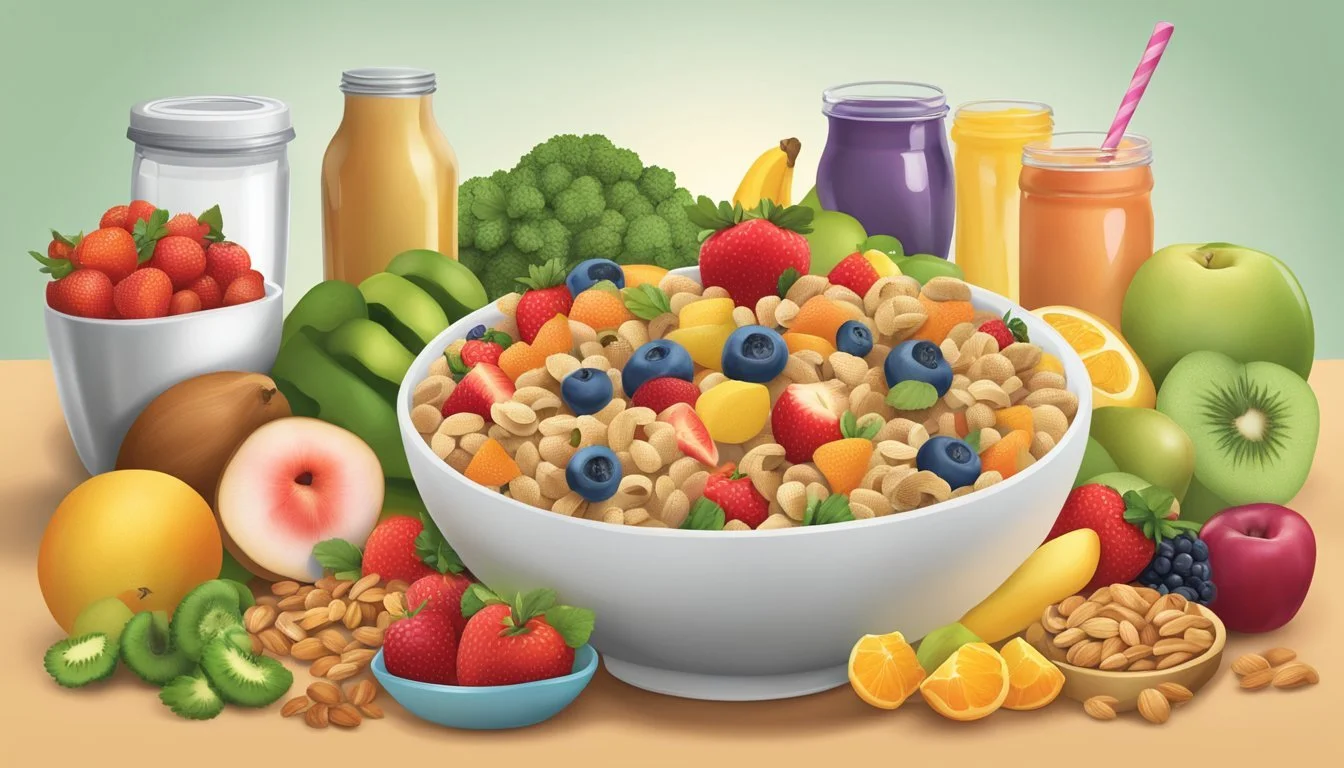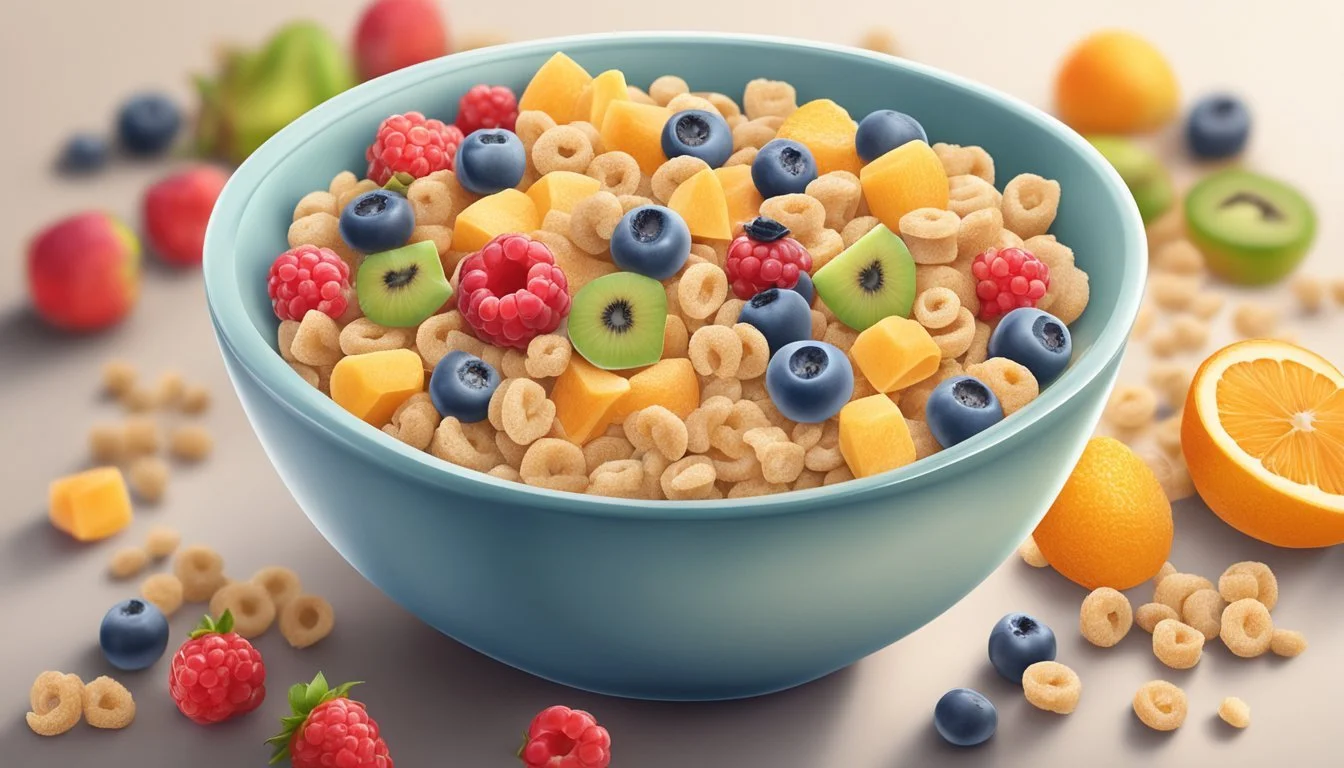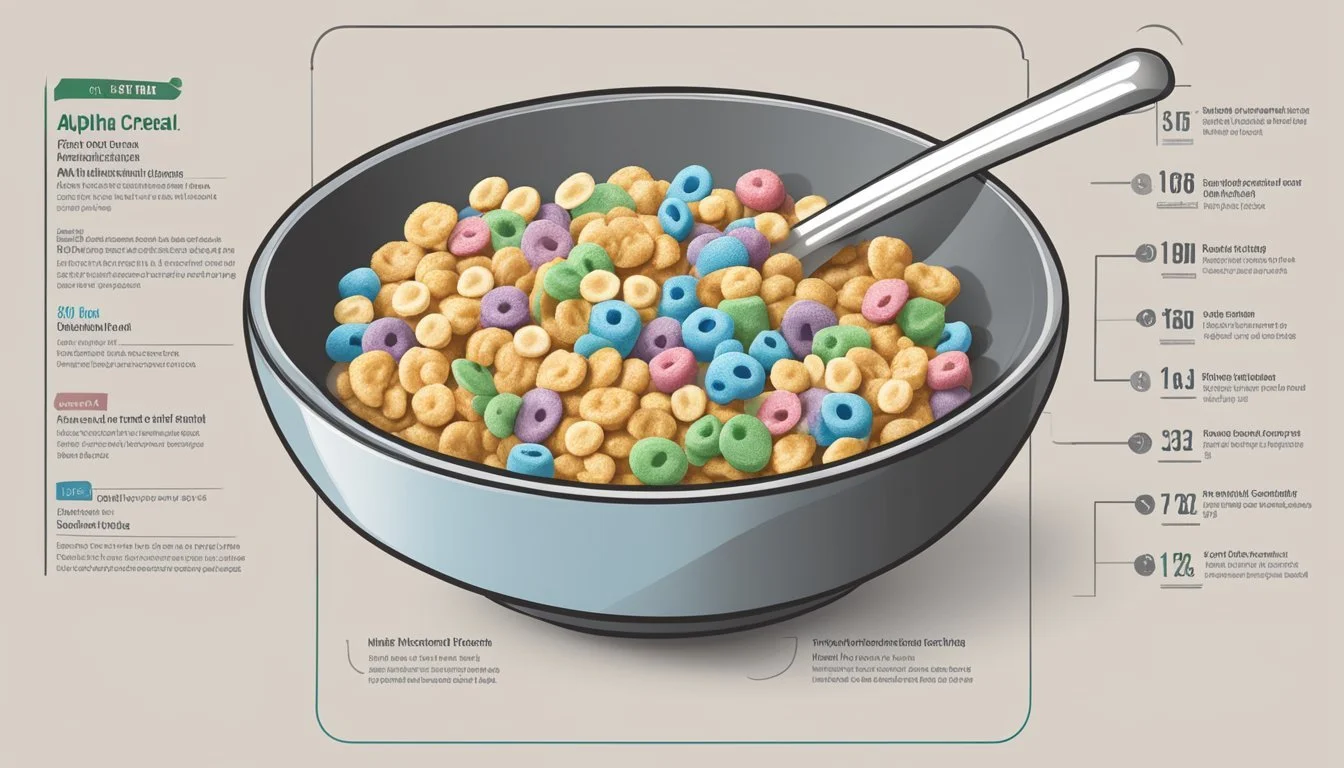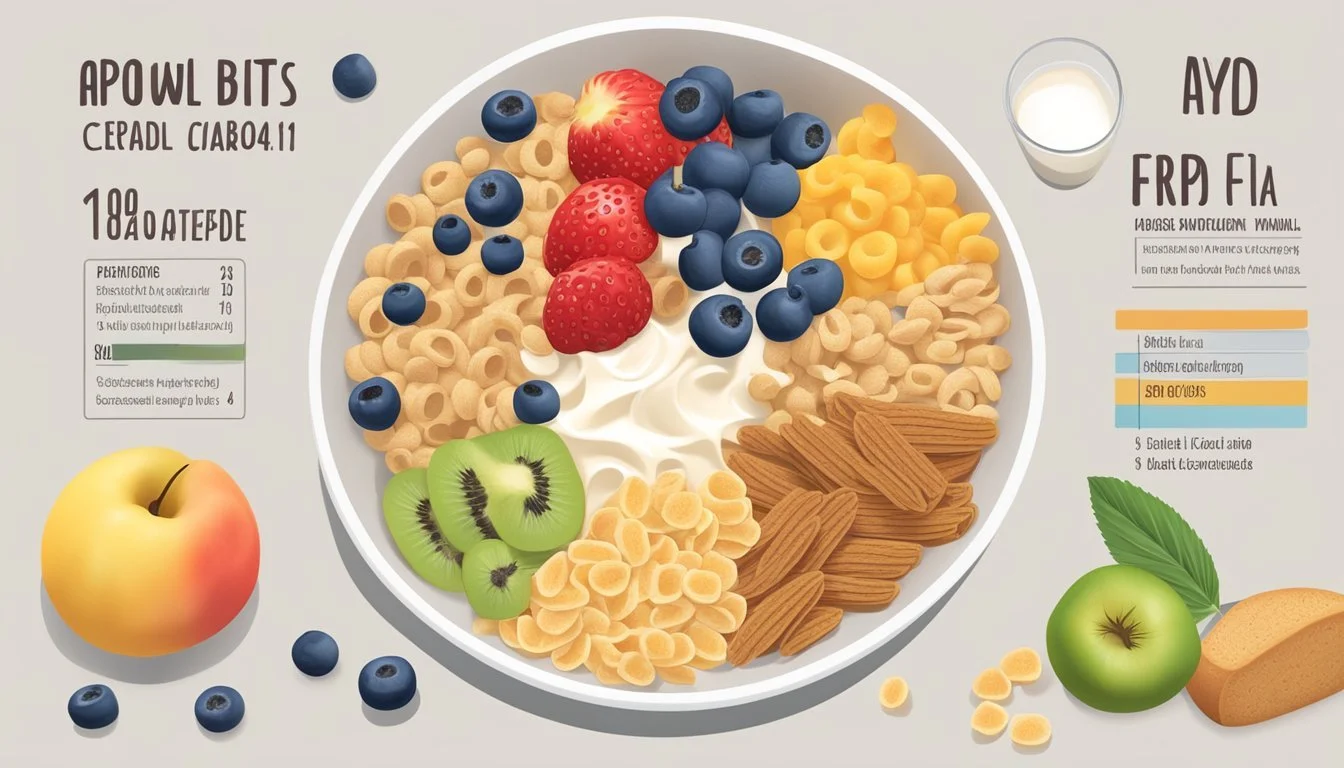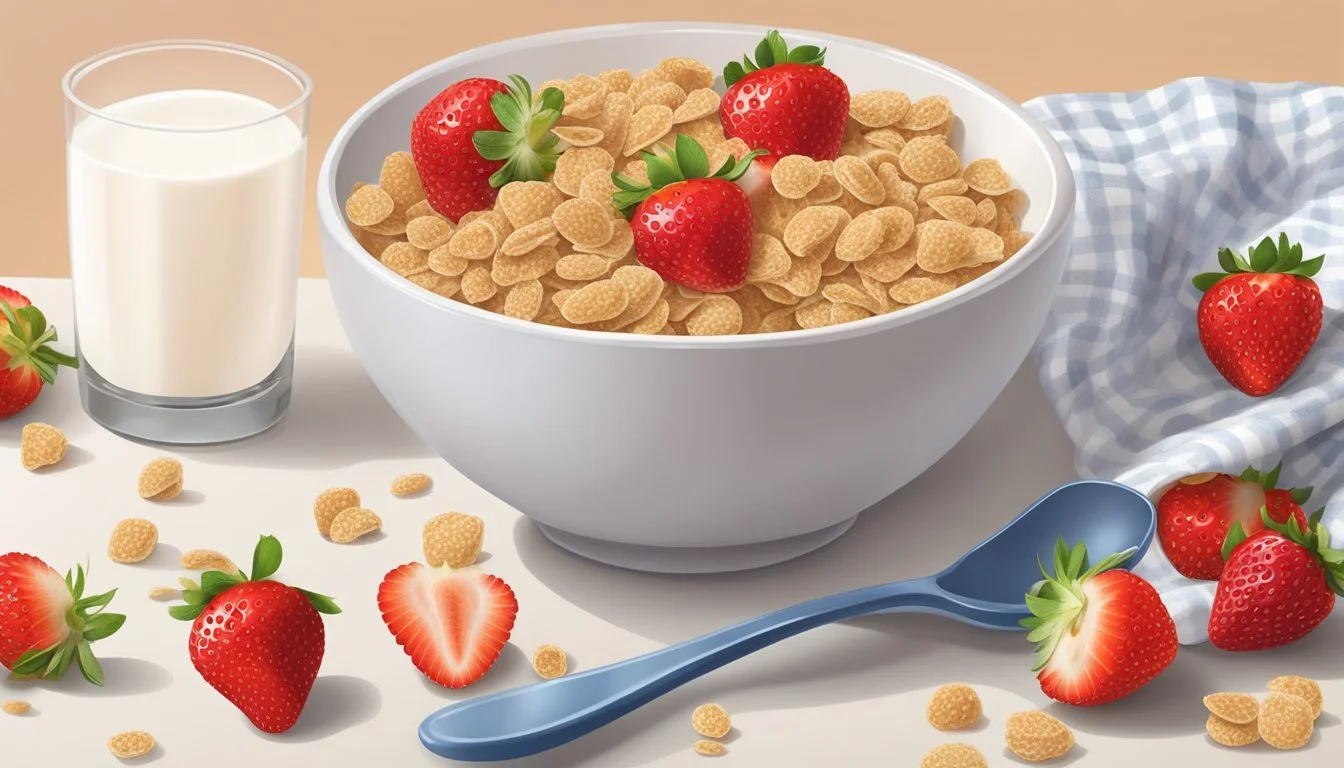Alpha-Bits Nutrition Facts & More
Essential Facts for a Balanced Diet
Alpha-Bits cereal has been a popular breakfast choice for decades. This letter-shaped cereal offers more than just a fun eating experience. A single serving of Alpha-Bits contains 130 calories, with a macronutrient breakdown of approximately 80% carbohydrates, 10% fat, and 10% protein.
The nutrition facts of Alpha-Bits reveal some noteworthy aspects. It provides a significant source of essential vitamins and minerals. A serving of Alpha-Bits delivers 120% of the daily value for iron, 26% for vitamin A, and 42% for vitamin B6. These nutrients play crucial roles in maintaining overall health and well-being.
While Alpha-Bits can be part of a balanced diet, it's important to consider its sugar content. Like many breakfast cereals, it contains added sugars. Consumers looking to manage their sugar intake may want to be mindful of portion sizes and frequency of consumption.
Nutritional Overview
Alpha-Bits cereal provides a mix of carbohydrates, proteins, and fats, along with essential vitamins and minerals. Its nutritional profile offers both benefits and drawbacks for consumers seeking a balanced breakfast option.
Macronutrient Breakdown
Alpha-Bits cereal contains 120 calories per serving. Carbohydrates make up the majority of its macronutrient content at 80.56%. This includes both complex carbohydrates from whole grains and simple sugars. The cereal provides 25g of net carbs per serving.
Protein accounts for 8.33% of the cereal's composition, offering a modest amount to support muscle maintenance and growth. Fat content is relatively low at 4.17%, contributing to the cereal's overall calorie count.
Fiber content helps promote digestive health, though specific amounts are not provided in the available data. Sugar content is notable, with 3.5 teaspoons per serving. This falls within the range of added sugars found in many breakfast cereals.
Vitamins and Minerals
Alpha-Bits is fortified with various essential vitamins and minerals. The cereal provides 100% of the Daily Value for several B vitamins, including B6, niacin, riboflavin, and folate. These nutrients support energy metabolism and nervous system function.
Iron is another key mineral present in Alpha-Bits, contributing to oxygen transport in the body. The cereal also contains calcium, important for bone health, though specific amounts are not listed in the available data.
Zinc and vitamin A are likely included in the fortification mix, supporting immune function and eye health respectively. Exact percentages of Daily Values for these and other micronutrients are not provided in the search results.
Dietary Fats Content
Alpha-Bits cereal contains minimal fat, with only 1 gram per serving. This low-fat content contributes to its overall nutritional profile as a primarily carbohydrate-based breakfast option.
Types of Fats
Alpha-Bits cereal has a very low total fat content. The 1 gram of fat per serving represents only 7.5% of the total calories. This small amount of fat is primarily composed of unsaturated fats, which are generally considered healthier than saturated fats.
The cereal contains no trans fats, which is beneficial for heart health. Saturated fat content is negligible at 0.35 grams per serving, or about 2% of the recommended daily value.
Fatty Acids Profile
The fatty acid profile of Alpha-Bits is limited due to its low overall fat content. The cereal does not contain significant amounts of omega-3 or omega-6 fatty acids. It lacks notable quantities of docosahexaenoic acid (DHA), eicosapentaenoic acid (EPA), or alpha-linolenic acid.
The small amount of fat present likely consists of trace amounts of various fatty acids commonly found in grains. These may include small quantities of oleic acid (a monounsaturated fat) and linoleic acid (a polyunsaturated fat).
Given its low fat content, Alpha-Bits is not a significant source of essential fatty acids in the diet. Consumers looking to increase their intake of beneficial fats would need to seek other food sources.
Sugar and Fiber
Alpha-Bits cereal contains both sugar and fiber, two important components that affect its nutritional profile. The balance between these elements impacts the cereal's overall health benefits and taste.
Types of Sugar
Alpha-Bits contains 6.7g of total sugars per serving. This includes naturally occurring and added sugars. Sucrose, glucose, and fructose are common types of sugars found in cereals. Added sugars contribute to the sweet taste but offer little nutritional value.
The American Heart Association recommends limiting daily added sugar intake to 25g for women and 37g for men. Alpha-Bits' sugar content represents about 27% of the recommended limit for women and 18% for men.
Excessive sugar consumption can lead to health issues like obesity and tooth decay. Choosing cereals with lower sugar content or mixing Alpha-Bits with low-sugar alternatives can help reduce overall sugar intake.
Dietary Fiber
Alpha-Bits provides 2.3g of dietary fiber per serving, which is 8% of the daily recommended value. Fiber is crucial for digestive health and can help maintain stable blood sugar levels.
There are two main types of dietary fiber:
Soluble fiber: Dissolves in water and can help lower cholesterol
Insoluble fiber: Promotes regular bowel movements and aids digestion
Whole grain ingredients in Alpha-Bits contribute to its fiber content. Increasing fiber intake can be achieved by combining the cereal with high-fiber fruits or nuts.
A balanced diet should include 25-30g of fiber daily. While Alpha-Bits provides some fiber, it's important to consume a variety of fiber-rich foods throughout the day to meet recommended intake levels.
Protein Content
Alpha-Bits cereal contains a small amount of protein. The protein in this cereal provides essential amino acids, though in limited quantities.
Essential Amino Acids
Alpha-Bits cereal offers 3 grams of protein per serving. This represents about 6% of the daily value for protein on a 2,000 calorie diet.
The protein in Alpha-Bits comes from wheat and corn ingredients. These plant proteins contain some essential amino acids, including lysine, methionine, and threonine.
However, the amounts and balance of essential amino acids in Alpha-Bits are not optimal. The cereal lacks sufficient quantities of all nine essential amino acids needed for complete protein.
To boost protein intake and amino acid profile, consumers may consider pairing Alpha-Bits with milk or yogurt. These dairy additions provide complementary amino acids like leucine, isoleucine, and valine.
For those seeking higher protein cereals, options with added soy, whey, or pea protein offer more complete amino acid profiles. These alternatives typically contain 7-15 grams of protein per serving.
Sodium and Cholesterol
Alpha-Bits cereal contains no cholesterol, making it a heart-healthy choice for those monitoring their cholesterol intake. This zero-cholesterol content is typical for most plant-based foods.
The sodium content in Alpha-Bits varies slightly between different sources. Some report 125 mg per serving, while others list 160 mg or 177.6 mg.
These sodium levels represent 5-7% of the recommended daily intake for adults. Moderate sodium content helps maintain proper fluid balance and nerve function in the body.
For individuals on low-sodium diets, Alpha-Bits may be a suitable option compared to some other breakfast cereals. However, it's important to consider personal dietary needs and consult with a healthcare professional.
While Alpha-Bits provides some nutritional benefits, it's part of a balanced diet. Pairing it with low-fat milk and fresh fruit can enhance its nutritional value and create a more complete breakfast.
Carbohydrate Details
Alpha-Bits cereal contains a significant amount of carbohydrates, making up the majority of its nutritional content. These carbs provide energy and contribute to the cereal's taste and texture.
Complex vs. Simple Carbs
Alpha-Bits cereal contains both complex and simple carbohydrates. The primary source of complex carbs is starch from the wheat used in the cereal. Starch provides sustained energy release and helps maintain fullness.
Simple carbs in Alpha-Bits come from added sugars. These sugars give the cereal its sweet taste but are absorbed more quickly by the body. A 30-gram serving of Alpha-Bits contains approximately 24 grams of total carbohydrates.
The cereal's sugar content contributes to its calorie count. Each serving provides about 120 calories, with most coming from carbohydrates. It's important to note that Alpha-Bits has a relatively high carbohydrate-to-fiber ratio.
Consumers watching their carb intake should be aware of the cereal's nutritional profile. While it does offer some vitamins and minerals, its carbohydrate content is substantial compared to its protein and fat content.
Health Claims and Considerations
Alpha-Bits cereal offers some nutritional benefits, but also has drawbacks to consider. The cereal provides 100% whole grains, which can contribute to daily fiber intake. Dietary fiber supports digestive health and may help manage cholesterol levels.
Alpha-Bits is fortified with various vitamins and minerals. It contains 120% of the daily value for iron, which is essential for oxygen transport in the body. The cereal also provides 26% of vitamin A and 42% of vitamin B6 daily values.
However, Alpha-Bits contains added sugars. One serving has 3.5 teaspoons of sugar, which includes both natural and added sugars. The American Heart Association recommends limiting added sugar intake to 6-9 teaspoons per day for adults.
The cereal's nutrition grade is C+, indicating moderate nutritional value. While it offers some benefits, it's important to consume it in moderation as part of a balanced diet.
Alpha-Bits does not contain significant amounts of omega-3 fatty acids. For those seeking omega-3s, other food sources like fatty fish or flaxseeds would be more beneficial.
Packaging and Serving Suggestions
Alpha-Bits cereal typically comes in colorful cardboard boxes featuring the iconic letter-shaped pieces. The packaging often includes fun games or activities to engage children.
A standard serving size of Alpha-Bits is 30 grams or approximately 3/4 cup. This portion provides around 110-124 calories, depending on the specific formulation.
For accurate nutrition tracking, it's important to measure servings carefully. Using a kitchen scale or measuring cup can help ensure proper portion control.
Alpha-Bits can be enjoyed in various ways beyond a simple bowl with milk. Some serving suggestions include:
Sprinkled over yogurt for added crunch
Mixed into trail mix for a sweet element
Used as a topping for ice cream or frozen yogurt
Incorporated into baked goods like cookies or muffins
The versatility of Alpha-Bits allows for creative serving options, making it appealing to both children and adults. Its letter shapes can also be used for educational activities, combining snack time with learning.
Product Variants and Flavors
Alpha-Bits cereal has maintained a relatively consistent product lineup over the years. The classic version features letter-shaped whole grain oat pieces with a light sweetness.
Some limited edition flavors have been introduced periodically. These include Marshmallow Alpha-Bits, which added colorful marshmallow pieces to the mix.
Alpha-Bits has also experimented with different grain compositions. A multigrain variant incorporated additional whole grains beyond just oats.
The cereal's sugar content has varied slightly. Current versions contain around 9 grams of sugar per serving. This places Alpha-Bits in a moderate range compared to other breakfast cereals.
Packaging sizes typically include standard cereal boxes and single-serve cups for on-the-go consumption. The iconic letter shapes remain a constant across all product variants.
While not as diverse as some cereal brands, Alpha-Bits offers enough options to appeal to different preferences. The focus remains on delivering a simple, lightly sweetened whole grain cereal experience.

